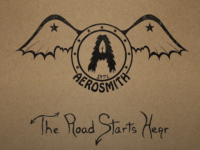As Steven Tyler — born on March 26, 1948 — celebrates another trip around the sun, we decided to travel deep into our Aerosmith collections. Here are a group lesser-known cuts from his cool-rocking band, most (but not all!) of which come from their creative peak in the 1970s. We also threw in one minor Aerosmith hit that still holds rather fond memories. Call it a gift for the birthday boy. …
“NOBODY’S FAULT,” (ROCKS, 1976): I discovered Aerosmith around the age of 12 or 13, when I got my hands on the original Greatest Hits. I guess I should say that I rediscovered them, since, when I started listening to that collection, I found out that I already knew most of the songs. Somewhere in the recesses of my mind, I remembered them from days riding around with my aunt, a teenager in the 1970s, jamming them on the radio.
There was something about the bluesy flavor, the cool and the attitude of Aerosmith that instantly appealed to me. It was much different from the majority of the music I was listening to at the time, and they quickly became my favorite band. Still are, though Black Sabbath has become a close rival.
My friends can attest that, in high school, if Aerosmith were on MTV or the radio before school, I’d be late, and I was willing to fight if you dared say anything bad about the band. I’ve mellowed since then, but there’s still one record I’m willing to fight over, 1976’s Rocks. It was the first Aerosmith record that I owned after Greatest Hits, and not only is it Aerosmith’s best record, but in my opinion, it’s the best hard-rock record ever.
There’s not a bad song on Rocks, but one sticks out, my favorite Aerosmith tune, “Nobody’s Fault.” The song immediately caught my attention because it’s something a little different from the band’s typical blues rock. It’s a heavier number with some weird wah effects on Joe Perry’s guitar that give it an apocalyptic overtone to go with the apocalyptic lyrics about earthquakes — again, an unusual topic for a band that was mostly about good-time rock ‘n’ roll. Joey Kramer pounds away on the drums, and Steven Tyler contorts his vocals into some strange areas on the bridge — so much so that it’s rarely performed live because it reportedly hurts his voice. Then there’s that big, memorable, hammering chorus hook that’s definitely the most Aerosmith-like moment of the song.
I’ve always felt that it’s the band’s most metallic song, and that was backed up by thrash band Testament’s excellent 1988 cover. (We won’t talk about any of the other horrible covers of the song over the years that made me want to hurt someone — I’m looking at you, Vince Neil). “Nobody’s Fault” may not be the most recognizable song in Aerosmith’s catalog, but it’s certainly one of the most distinct. — Fred Phillips
“CHIP AWAY THE STONE,” (LIVE BOOTLEG, 1978): Oh man, Live Bootleg was a big pile of ugly. I loved every minute of it.
Despite the fact that the band had let me down the previous year (by cancelling a show that I had tickets for), I couldn’t turn on them and not buy this record. I was (and still am) a big fan of live albums and this one didn’t disappoint. “Chip Away The Stone” has everything I loved in hard rock, the most important thing being band members who plugged their guitars into their amps with those curly guitar cords … amps that were turned up about as far as they could go.
The main guitar riff is so full of crunch that it almost feels like it’s alive. — Mark Saleski
“MOVIN’ OUT,” (AEROSMITH, 1973): “Dream On,” of course, is a bonafide rock classic. And “Mama Kin” is a fan favorite, and one of the best straight-up rockers in Aerosmith’s catalog. Still, I feel like the band’s self-titled debut album gets overlooked. To me, it’s the second best in their repertoire, with a very bluesy feel on most of the songs, and it even includes a rocking cover of Rufus Thomas’ “Walkin’ the Dog.”
There’s no better example of the earthy bluesiness of this album, though, than “Movin’ Out.” The song opens with a grooving acoustic guitar riff and you can almost visualize Perry and Tyler sitting on the porch of a run-down shack singing that they’ve “gotta move it out ’cause the city’s movin’ in.” Then the electric guitars kick in, and we get a slinky, bendy riff, while Tyler wails over it. It brings an almost gospel feel to the song. After building to a screaming crescendo, they bring things back full circle to the porch, dropping down into that earthy first verse again to close out.
It’s a familiar theme for Aerosmith, who used it again to good effect on “Hangman Jury” from 1987’s Permanent Vacation, but it’s never been more effective than on “Movin’ Out.” — Fred Phillips
“BIG TEN INCH RECORD,” (TOYS IN THE ATTIC, 1975): So many rock bands who came up from the 1980s onward were influenced by groups like Aerosmith. Aerosmith in turn were inspired in part from music that seems so far removed from the hard rock bands that followed in their wake, like the vintage jump blues of the ’40s and ’50s.
Maybe you have to listen hard to find the connection sometimes, but not so at all on “Big Ten Inch Record,” a song on a classic hard rock album that’s perfect for doing the Lindy Hop in your zoot suit. Of course, what everyone with a worn copy of Toys In The Attic remembers about this 1952 Bull Moose Johnson cover is the double entendre made evident right on the song title.
Steve Tyler loves him a good sexual connotation, so the music and lyrics might be Bull Moose’s but the swagger is all Aerosmith. — S. Victor Aaron
“TASTE OF INDIA,” (NINE LIVES, 1997): Aerosmith’s post-1970s work has certainly been spotty. It ranges from the mediocre (1985 reunion album Done with Mirrors and 2003’s uber-commercial Get a Grip) to an album that arguably rivals their ’70s material (1989’s Pump) to some truly terrible records (1982’s Joe Perry> and Brad Whitford-less Rock in a Hard Place and the 2001 electronic mess Just Push Play). And don’t even get me started on the train wreck that is “I Don’t Want to Miss a Thing,” or we’ll be here all night.
Often forgotten, though, is the band’s 1997 album Nine Lives. Sure, it had a novelty hit in the suggestive single “Pink,” but there were plenty of other really good songs, like the rocking title track, the drinking tune “Full Circle” and the smoky, bluesy lounge number “Ain’t That a Bitch.” Perhaps the most interesting, though, is the exotic, double-entendre laden “Taste of India.”
I like it for a lot of the same reasons that I like “Nobody’s Fault.” It’s something a little out of the box for the band. It opens with a sarangi piece, and uses sitars and big bending licks from Perry to give it an eastern feel. There’s also some pretty rocking stuff to go along with the exotics in the song. Check out the almost metallic marching guitar riff about halfway through before everything drops out, and it starts over with the sitars from the beginning.
It didn’t do well as a single, but it’s one of my favorite Aerosmith tunes from the latter part of their career. — Fred Phillips
“GET THE LEAD OUT,” (ROCKS, 1976): The big hit from Rocks was, of course, “Back In The Saddle.” Great song, but the guitar player in me was always attracted to the snazzy opening riff of “Get The Lead Out.”
It’s the kind of riff that sets up a tremendous groove while propelling the song forward. All I know is that when I played Rocks (probably more often than any other Aerosmith album back then) the volume knob just had to edge up a little higher during this one. — Mark Saleski
“NO SURPRIZE,” (NIGHT IN THE RUTS, 1979): Initially, this was one of my least favorite Aerosmith records. Perry left during the recording, the cracks are, at times, obvious. Also, for some strange reason, it took me years to get the play on words in the title. But as I’ve grown older, I’ve come to appreciate this album much more.
“No Surprize” pretty much sums up everything that I love about Aerosmith. A song that’s about the band itself, it’s just a balls-out rocker that makes no excuses or apologies, and it captures the essence of their 1970s incarnation. It also doesn’t hurt that there are some great, memorable lines in the song — among them, “some bitch in the choir threw the water on the fires of hell” or “vaccinate your ass with your phonograph needle.” It may not be high poetry, but it’s great rock ‘n’ roll. And that is, after all, what you want from Aerosmith. — Fred Phillips
“COME TOGETHER,” (SGT. PEPPER’S LONELY HEARTS CLUB BAND: THE ORIGINAL MOTION PICTURE SOUNDTRACK, 1978): OK, so I’m supposed to come right out and say how much I hated the Bee Gees, that Peter Frampton destroyed his career with this film, and that Aerosmith stepped over the line to play this Beatles classic. Yeah, I wasn’t much of a Bee Gees fan back then but they always say that it was Robert Stigwood who should have taken the blame.
The thing is, I only have a vague memory of the movie. Me and my girlfriend went to see it, bought tickets, parked our young selves down in the dark and then proceeded to do what nearly everybody does at one time or another: not watch the movie. Hey, maybe we watched the opening credits. I really can’t say. All I know is that we were both exhausted and kinda woozy on our way out after the show … at which time we bumped into a couple of guys from our high school who were heading in for the second showing. We decided to buy another set of tickets and watch the movie with them. Did we like it? Ah, I dunno. We probably sailed through it on the post-whatever-it-was-that-we’d-been-doing endorphin buzz. I do know this: to this day, when either of us hears the words “Sgt. Pepper,” we have to suppress a slight grin … and it’s not the Beatles we’re thinkin’ about.
Oh, and to witness the full supposed sacrilege of Aerosmith covering the Beatles, you’ve got to listen to the Live Bootleg version. — Mark Saleski
- Angell & Crane, “Himalayan Dial-Up” from ‘Angell & Crane’ (2024): Video Premiere - November 22, 2024
- Michael Attias, “Avrils” from ‘Quartet Music Vol. II- Kardamon Fall’ (2024): Streaming premiere - October 11, 2024
- Bryn Roberts, “Aloft” from ‘Aloft’ (2024): Video Premiere - September 20, 2024





I agree with most of your comments, but Rock in a hard place was awesome. Lightning strikes and Joanie’s butterfly. Cry me a river is just one of the best vocal performances Steven Tyler ever did and then you get treated to Steven playing drums on the old style smoky bar room Jig is up. I didn’t even mention bolivian ragamuffin and bitch’s brew. Kramer’s drumming on this album is perfect all the way through; heavy and funky playing with real passion. When I heard this album, I realized Tyler was the genius in Aerosmith and he could write with anyone. I saw them twice on this tour and they were great. I would rate this album right up there, albeit does not show the genius that Rocks and Pump did, it was still a really great hard rock album. I’d rate it up there with draw the line and call it better than ruts.